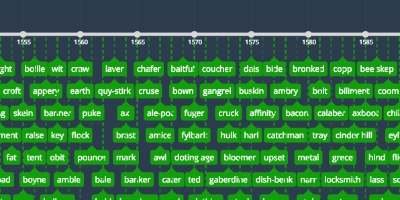jan 1, 1546 - gull
Description:
The OED has the three headwords gole, gool, and gull, which could all have the meaning ‘stream’ or ‘watercourse’ and the evidence suggests that they share a common origin. The Yorkshire place-name Goole has spellings which support that suggestion and trace its changes in meaning: 1306 <i>pro decimis de Gull Lewth</i> [sic for laith] (YRS13/131); 1362 <i>Gulle in Houk</i>, a watercourse, and <i>aque Gulle</i> (PNWR2/16); 1398 <i>querentium bladum</i> at <i>le Gullath</i> (SAR72); 1412 <i>Goulle Lathes </i>[a grange] (YRS118/39); 1480 ‘the townships of <i>Howke, Airmyn</i> and <i>Goule</i>’ (CYS193); 1540 <i>tythes ... of hooke, gull and armyn</i> (YRS13/353); 1546 <i>Hoke Chapell, wherin is one chaplane ... to the towneships of Armyn, Hoke, and Gowle</i> (SS92/288). As a vocabulary item the word occurs in the same area: 1356 <i>racione gullae currentis in Merskland</i>, Selby (YRS13/49); 1411-2 <i>per diluvia de les Gulles</i>, Selby (YRS118/44). The OED quotes: 1832 <i>any sudden</i> <i>breach or goole ... made in ... the east bank</i>, from the Holderness Drainage Act.Added to timeline:
Date:
jan 1, 1546
Now
~ 479 years ago
